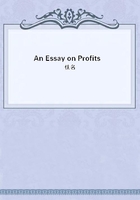Mrs.Belloc was more than regretful; she was distressed.Said she: ``I've taken a tremendous fancy to you, and I hate to give you up.I'd do most anything to keep you.''
Mildred explained that her work compelled her to go.
``That's very interesting,'' said Mrs.Belloc.``If Iwere a few years younger, and hadn't spent all my energy in teaching school and putting through that marriage, I'd try to get on the stage, myself.I don't want to lose sight of you.''
``Oh, I'll come to see you from time to time.''
``No, you won't,'' said Mrs.Belloc practically.``No more than I'd come to see you.Our lives lie in different directions, and in New York that means we'll never have time to meet.But we may be thrown together again, some time.As I've got a twenty years' lease on this house, I guess you'll have no trouble in finding me.I suppose I could look you up through Professor Jennings?''
``Yes,'' said Mildred.Then impulsively, ``Mrs.
Belloc, there's a reason why I'd like to change without anyone's knowing what has become of me--I mean, anyone that might be--watching me.''
``I understand perfectly,'' said Mrs.Belloc with a ready sympathy that made Mildred appreciate the advantages of the friendship of unconventional, knock-about people.``Nothing could be easier.You've got no luggage but that bag.I'll take it up to the Grand Central Station and check it, and bring the check back here.You can send for it when you please.''
``But what about me?'' said Mildred.
``I was coming to that.You walk out of here, say, about half an hour after I go in the taxi.You walk through to the corner of Lexington Avenue and Thirty-seventh Street--there aren't any cabs to be had there.
I'll be waiting in the taxi, and we'll make a dash up the East Side and I can drop you at some quiet place in the park and go on--and you can walk to your new address.How does that strike you?''
Mildred expressed her admiration.The plan was carried out, as Mrs.Belloc--a born genius at all forms of intrigue--had evolved it in perfection on the spur of the moment.As they went up the far East Side, Mrs.Belloc, looking back through the little rear window, saw a taxi a few blocks behind them.``We haven't given them the slip yet,'' said she, ``but we will in the park.'' They entered the park at East Ninetieth Street, crossed to the West Drive.Acting on Mrs.
Belloc's instructions, the motorman put on full speed--with due regard to the occasional policeman.At a sharp turning near the Mall, when the taxi could be seen from neither direction, he abruptly stopped.Out sprang Mildred and disappeared behind the bushes completely screening the walk from the drive.At once the taxi was under-way again.She, waiting where the screen of bushes was securely thick, saw the taxi that had followed them in the East Side flash by--in pursuit of Mrs.Belloc alone.
She was free--at least until some mischance uncovered her to the little general.At Mrs.Brindley's she found a note awaiting her--a note from Stanley Baird:
DEAR MILDRED:
I'm of for the Far West, and probably shall not be in town again until the early summer.The club forwards my mail and repeats telegrams as marked.Go in and win, and don't hesitate to call on me if you need me.No false pride, PLEASE! I'm getting out of the way because it's obviously best for the present.
STANLEY.
As she finished, her sense of freedom was complete.
She had not realized how uneasy she was feeling about Stanley.She did not doubt his generosity, did not doubt that he genuinely intended to leave her free, and she believed that his delicacy was worthy of his generosity.Still, she was constantly fearing lest circumstances should thrust them both--as much against his will as hers--into a position in which she would have to choose between seeming, not to say being, ungrateful, and playing the hypocrite, perhaps basely, with him.
The little general eluded, Stanley voluntarily removed;she was indeed free.Now she could work with an un-troubled mind, could show Mrs.Brindley that intelligent and persistent work--her ``biggest if in all the world''--was in fact a very simple matter.
She had not been settled at Mrs.Brindley's many hours before she discovered that not only was she free from all hindrances, but was to have a positive and great help.Mrs.Brindley's talent for putting people at their ease was no mere drawing-room trick.
She made Mildred feel immediately at home, as she had not felt at home since her mother introduced James Presbury into their house at Hanging Rock.Mrs.
Brindley was absolutely devoid of pretenses.When Mildred spoke to her of this quality in her she said:
``I owe that to my husband.I was brought up like everybody else--to be more or less of a poser and a hypocrite.In fact, I think there was almost nothing genuine about me.My husband taught me to be myself, to be afraid of nobody's opinion, to show myself just as I was and to let people seek or avoid me as they saw fit.He was that sort of man himself.''
``He must have been a remarkable man,'' said Mildred.
``He was,'' replied Mrs.Brindley.``But not attractive--at least not to me.Our marriage was a mistake.We quarreled whenever we were not at work with the music.If he had not died, we should have been divorced.'' She smiled merrily.``Then he would have hired me as his musical secretary, and we'd have got on beautifully.''
Mildred was still thinking of Mrs.Brindley's freedom from pretense.``I've never dared be myself,''
confessed she.``I don't know what myself really is like.
I was thinking the other day how for one reason and another I've been a hypocrite all my life.You see, I've always been a dependent--have always had to please someone in order to get what I wanted.''
``You can never be yourself until you have an independent income, however small,'' said Mrs.Brindley.















